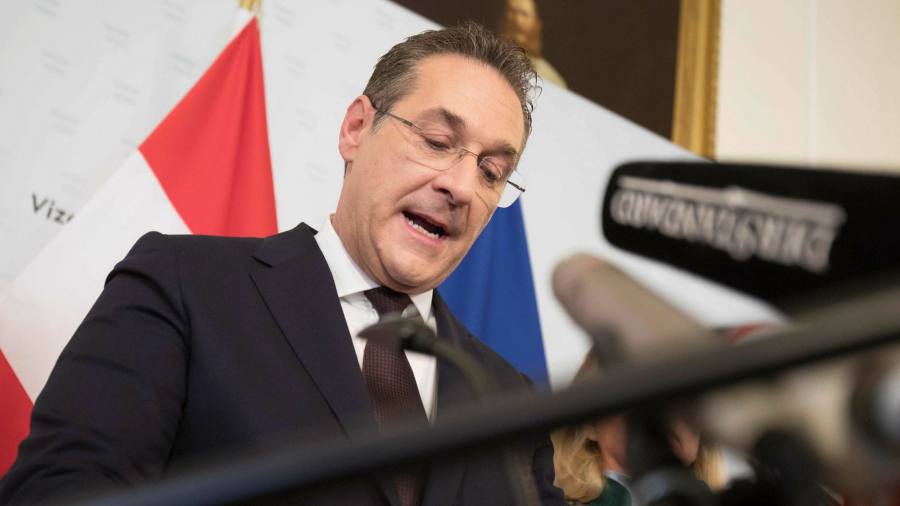[ad_1]
The man behind the notorious “Ibiza video†that brought down Austria’s government in 2019 said he was seeking asylum in Germany to escape “political persecution†in his homeland, in a case that risks becoming a diplomatic bone of contention between Vienna and Berlin.Â
Julian H was arrested in Berlin last year on an international arrest warrant. Austrian authorities are seeking to extradite him to face charges of drug-dealing and attempted blackmail.
But H insisted he was innocent. “They’re standard criminal charges . . . but they arise out of a case that is highly politicised,†he said in an interview in Berlin’s Moabit prison. “This [case] stinks of political persecution.†He added that, if sent back to his homeland he had “little hope of a fair trialâ€.
Covertly filmed in an Ibiza villa in 2017, H’s video appeared to show Heinz-Christian Strache, then-leader of the far-right Freedom Party (FPÖ), soliciting political funding from Russia in exchange for government contracts. Its release caused a political earthquake in Austria, triggering Strache’s resignation as vice-chancellor.
Soon after, Austria’s chancellor Sebastian Kurz dissolved the coalition government between his mainstream conservative People’s Party (ÖVP) and the FPÖ.
For years, the identity of the mastermind behind the set-up was known only to a group of journalists and police investigators. That changed in December when H — under German law, his surname cannot be divulged — was arrested.
In his first interview with a non-German news outlet, H, a private detective, said he conceived the plot as a “mirror†held up to Austrian politics and society. “I wanted to show how easy it would be to involve a leading politician in a corrupt deal . . . I showed that even with a tiny budget you could compromise a politician who would soon become vice-chancellor.â€
But he said he did not expect the video to have such an impact. “I only ever wanted to flag up Strache’s alleged corruption and . . . the dangers of rightwing populism, which was running rampant at the time,†he said. “I never intended to trigger a government crisis.â€
In the video, Strache appeared to discuss possible deals with a woman introduced as the niece of a Russian oligarch. He is heard suggesting he would hand her lucrative state contracts if she purchased Austria’s popular tabloid, the Kronen Zeitung, and made it an FPÖ mouthpiece.
After the video’s release, Strache described the meeting as a “mistakeâ€. But he said media accounts of the conversation were heavily edited and that he had insisted throughout he would do nothing illegal. He was the victim of a “calculated political hit-job†and an “attack by the intelligence agenciesâ€, he said.Â
H dismissed claims that foreign spy agencies had been involved in the sting operation as “pretty amusingâ€. “I did everything myself, even setting up the cameras. That’s why it was all so unprofessional.â€
He said the idea for the video came about after a former bodyguard of Strache approached a Viennese lawyer identified as M with evidence he had gathered about the politician. M. and H. hoped that by filming Strache covertly they could lend the ex-bodyguard’s claims more credibility.
H said he was also motivated by concerns about creeping Russian influence on Austrian politics. “Austria is an unbelievably soft target,†he said. “Politicians have an affinity for donors and donations. And they don’t check the donors very thoroughly.â€
However, attempts by M to interest various Austrian businessmen and politicians in the video led nowhere. Meanwhile, as rumours about the footage circulated, H said he feared his role would be exposed.
His concerns grew after the FPÖ entered government in 2017 and took over the defence and interior ministries. “That’s when I started to panic,†he said.
He later passed the footage to two German news organisations who published details of the Ibiza encounter in May 2019.
In the aftermath of the reports, H, who had since moved to Germany, was accused by Austrian authorities of improper use of recording equipment, selling cocaine and attempting to blackmail Strache.Â
H has described these accusations as “trumped upâ€. His lawyer said the drug-dealing charge was based on testimony from a man with convictions for fraud who had previously slandered H. He said one of those who allegedly bought drugs from H denied having done so. On the last charge, the lawyer said, Strache himself denied ever being blackmailed over the video.Â
The Higher Court of Berlin decided that making the video was not a punishable offence, but remanded H in custody on the other charges.
A spokeswoman for the Berlin criminal court system said there was “no evidence†that H could be “persecuted or punished for his political views†if extradited to Austria and that there was “no doubt†he would have a fair trial there. However, she said the court had delayed a decision on extradition “in order to further examine the facts†of the case.
H acknowledged he faced an uphill task. “The problem is that if they grant me asylum, they’re virtually saying I’m the victim of political persecution in Austria, which is a serious thing to say about a fellow EU member,†he said. “It seems the judicial authorities in Berlin are unwilling to risk a diplomatic incident.â€
[ad_2]
Source link





